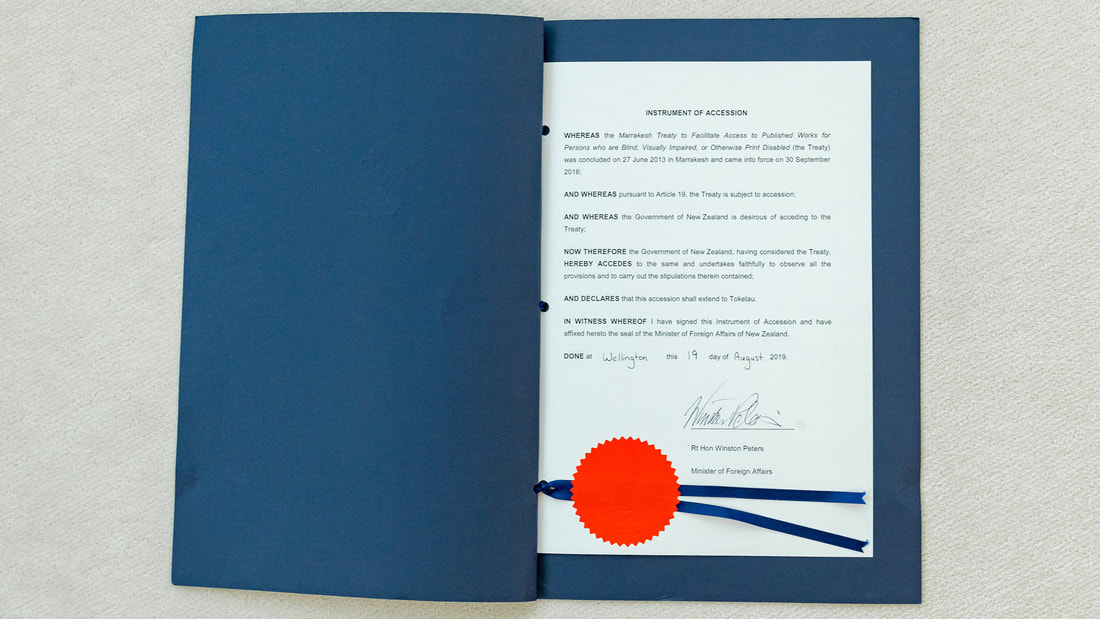Webinar
Please enter any questions you might have into this spreadsheet in advance to give the committee a chance to prepare.
What is the Marrakesh Treaty?
An estimated 90% of all written works published worldwide are not available in formats accessible to people with a print disability. This barrier affects an estimated 168,000 New Zealanders. Kris Faafoi, Minister of Commerce and Consumer Affairs stated that, 'the Marrakesh Treaty means an end to a ‘book famine’ experienced by many of New Zealand’s blind citizens, as they will now be able to access an international virtual library through global collaboration.'
The treaty’s provisions are designed to address problems such as long waits for authorisation or accessible format copies from a copyright owner, unreasonable restrictions imposed on accessible formats, and barriers to cross-border exchange of available accessible works that often result in duplication of production efforts.
What types of works are covered?
What are Print Disabilities?
What are Accessible Formats?
Some examples of accessible formats include but are not limited to Braille, large print and audio books. Librarians will be able to scan copyright works, such as books and journal and run through optical character recognition (OCR) software.
What is the process involved with scanning a work?
This makes the work accessible to anyone who is blind or has low vision. OCR copies allow a PDF to be converted from text to voice or manipulated by changing font size or background colour. The gold standard for the production of accessible digital books by commercial publishers in various formats is EPUB3 and we envisage that purchasing a born accessible copy directly from a publisher or author will be the cheapest and fastest way for libraries to provide access to these works. It may take some time and investment for New Zealand publishers to start publishing in accessible formats, however we believe that the passing of this legislation will provide a much needed boost to publishers to invest in producing born accessible content.
For the past 18 months, a core group of ‘Born Accessible’ key leads have been working towards the goal of improving access to e-books for people with a print disability so they can more easily participate in reading, both for pleasure and in formal education. Key leads come from the Blind Foundation, Blind Citizens NZ, and Auckland Libraries with support from Blind and Low Vision Education Network NZ, Publishers Association NZ and Copyright Licensing New Zealand.
How does this affect librarians?
- Make and provide an accessible format copy
- Import an accessible format copy
- Reproduce and provide accessible format copies imported into New Zealand under the Act
- Export an accessible format copy
What are the conditions?
The information you need to provide to MBIE is the full name of your organisation and the contact details for a person who MBIE can contact if they have any questions. Your contact details will not be published.
The library must also:
- Notify the copyright owner that it intends to make a copy
- Respect the integrity of the original work
- Only provide the accessible format copy to a person with a print disability or someone acting on their behalf or another authorised entity
- Keep records and permit the copyright owner to inspect these
Librarians should be aware that there is significant concern by authors and publishers that these electronic files may find their way on to the Internet and have an impact on the ability of authors to sell their books. You should make sure that you remind the print disabled person that you are making the copies for, that any further copying, posting on social media and sharing of these works with others will be a breach of copyright.
How can I find out more?
The full Marrakesh amendments to the copyright act can be found here.
If you have a specific questions you’d like answered please email the LIANZA Standing Committee on Copyright: [email protected]



 RSS Feed
RSS Feed